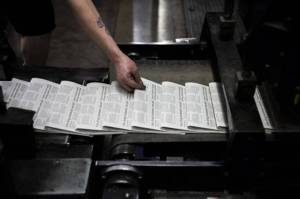Comment: Social Security bump will force issue of its future
Published 1:30 am Friday, October 14, 2022
By Allison Schrager / Bloomberg Opinion
Social Security is known as the third rail of politics. President Biden has pounced on all who dare even think about curtailing the retirement program. In fact, this week cash-strapped retirees will get the biggest cost-of-living increase in 40 years, an 8.7 percent boost to protect them from inflation.
For many retirees on fixed incomes, that’s a godsend. Some Republicans are considering reforming the program, an idea that could be political suicide. It’s also the right thing to do.
The Social Security trust fund is expected to run out of money in 2035. At that point, taxes taken in will cover only 80 percent of the benefits paid out each month. If nothing is done, that could mean Social Security recipients are in store for a 20 percent benefit cut. Recent inflation may speed up this time frame. Benefits are indexed to inflation and the tax revenue that covers the benefit increases is based on wages. If wages rise more than inflation, then Social Security stays on track. But in the last year inflation has risen more than wages, which could hasten Social Security’s shortfall date.
Already, many Americans think they can’t rely on Social Security. In 2019, 42 percent of those polled expect no benefits at all by the time they retire. This suggests some serious cognitive dissonance. Many Americans know they need Social Security and are worried it won’t be there for them, but most also oppose reform.
The fact that so many people are worried that they will never see their benefits also suggests a very serious communications failure because the odds are Social Security will be there for everyone, in some form. The very worst-case scenario is a 20 percent benefit cut. And odds are excellent even that won’t happen. Social Security is extremely popular and it’s very unusual to subject pensioners to benefit cuts. Most countries would sooner default on their bondholders than cut pensions. In theory, that missing 20 percent could be paid for by other taxes, or by running bigger deficits.
Or maybe next decade, when coming face-to-face with the shortfall, politicians will finally address Social Security finances and either cut benefits or increase the payroll tax; or most likely, some combination of the two.
But no matter what happens, there is a cost to waiting. The Social Security Administration estimates that benefit cuts and tax increases would be smaller if the problem were addressed sooner rather than later because more generations can share the cost. Running up debt or increasing taxes may also not be so easy in another 10 years. Democrats favor increasing taxes on the people who earn more than $250,000, but the tax increases that would be necessary are large. It would take at least a 12.4 percentage point increase in marginal tax rates on higher earners. That doesn’t leave much room to finance any other spending programs.
The U.S. government is already facing large unfunded debts. Entitlement obligations like Social Security (which aren’t counted as debt), add another $112 trillion over the next 30 years, and it’s even more expensive than normal debt because, as we saw this week, it’s indexed to inflation. One of the few benefits of high inflation is that it’s good for debtors because inflation erodes the value of debt. But both Social Security and Medicare’s cost rise with inflation (in Medicare’s case health inflation), which means even less fiscal room not only to finance entitlements, but any other programs.
When interest rates and inflation were low, it seemed politicians had all the time in the world to deal with entitlements. Now politicians who chose to ignore Social Security’s financing issues appear to be banking on a return to low rates and negligible inflation.
Anyone who is concerned about entitlements and debt has been screaming into the wind for decades. But as the current environment has shown, the future is uncertain. The same people who dismissed inflation also don’t think the U.S. government will ever face constraints on its borrowing. The inflation adjustment this week should act as a warning that this is a serious risk, and now is the time to deal with it.
Allison Schrager is a Bloomberg Opinion columnist covering economics. A senior fellow at the Manhattan Institute, she is author of “An Economist Walks Into a Brothel: And Other Unexpected Places to Understand Risk.”


